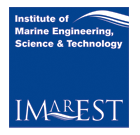 Shipping our fuel, food and goods across the world is estimated to produce more CO2 than the national emissions of the UK or Germany alone. But unpicking exactly how much, and by whom, and then estimating the potential to reduce and manage these emissions can involve a complicated m ix of data from satellites, shipyards and seafarers.
Shipping our fuel, food and goods across the world is estimated to produce more CO2 than the national emissions of the UK or Germany alone. But unpicking exactly how much, and by whom, and then estimating the potential to reduce and manage these emissions can involve a complicated m ix of data from satellites, shipyards and seafarers.
‘Shipping and Climate Change: how Science can aid an industry that emits more CO2 than the UK’, taking place in the Sir Ambrose Fleming Lecture Theatre, UCL, London WC1E 7JE on Monday 18 March is the second lecture in the ‘Sea Changes Lecture Series’. The series, organised by the Institute of Marine Engineering, Science and Technology (IMarEST) in association with University College London (UCL), aims to examine the relationship between marine science, technology and engineering.
The lecture will be presented by Dr Tristan Smith, UCL Energy Institute, London and Professor John Carlton, City University, London and will be chaired by Dr Alistair Greig, UCL Mechanical Engineering, with Dr Gillian Reynolds, Environment and Sustainability Consultants and Professor Richard Bucknall, UCL as panellists when the floor is opened for discussion in what is bound to be an interesting debate.
On-going work at UCL on the topic of reducing shipping emissions will be outlined, as will deductions about what it tells us about the future of ships and shipping. Strategies for reducing greenhouse gas emissions from shipping can be broken down into three categories, the lecturers explain: “Operational changes that reduce fuel consumption, technological advances that improve ship fuel efficiency, and alternative fuels with lower net lifecycle GHG emissions. Additionally, facing this tremendous challenge requires co-operation between scientists, engineers, technologists and policy makers, all of whom have vital roles to play.”
Further information Attendance at the lecture and reception is free of charge to all, expressions of interest in attending should be sent to technical@imarest.org. a further lectures in the series on ‘Invasive Species’ will take place at UCL on 7 May, with other lectures scheduled to take place elsewhere in the country in June. The 18 March lecture is recognised as contributing to Continuing Professional Development, with certificates available at the event.
About IMarEST
The IMarEST is the leading international membership body and learned society for all marine professionals. It is the first Institute to bring together marine engineers, scientists and technologists into one multi-disciplinary professional body. With 15, 000 international members based in over 100 countries, it is the largest marine organisation of its kind.
Working with the global marine community, the IMarEST promotes the scientific development of marine engineering, science and technology, providing opportunities for the exchange of ideas and practices and upholding the status, standards and expertise of marine professionals worldwide. The IMarEST is a respected authority in every maritime country. It is a Non-Governmental Organisation at the UN International Maritime Organization (IMO), has special consultative status with the Economic and Social Council of the United Nations (ECOSOC) and is a nominated and licensed body of the Engineering Council (UK), a member of the Science Council and has significant links with many other maritime organisations worldwide.
IMarEST also run a series of industry leading events and conferences as well as publishing internationally recognised titles: Marine Engineers Review (MER); Shipping World & Shipbuilder; Maritime IT and Electronics; Marine Scientist; and Offshore Technology.-





